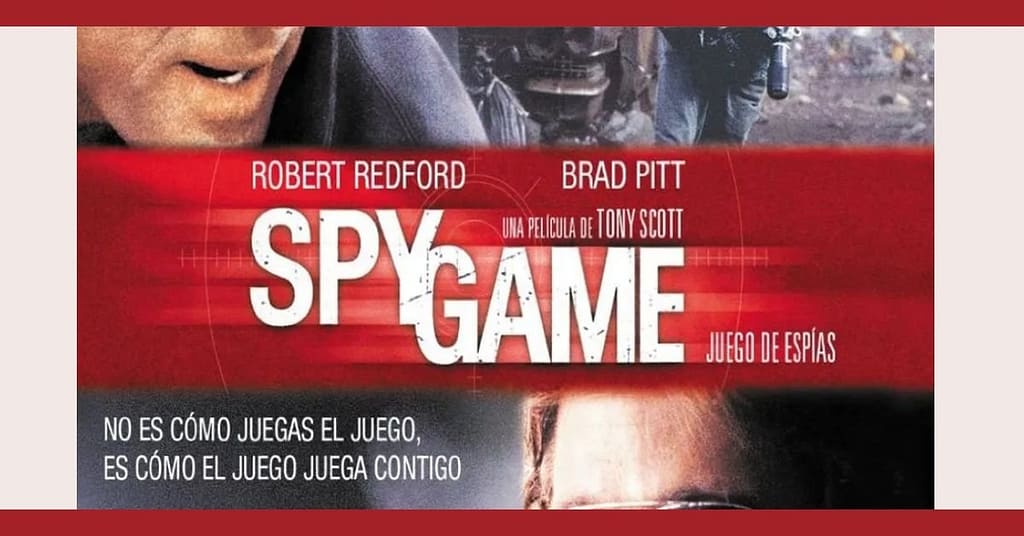The film industry is filled with countless genres that cater to different tastes, but few have the enduring allure of the spy thriller. Among the many films in this genre, Spy Game, directed by Tony Scott and starring Robert Redford and Brad Pitt, stands out as a quintessential example of the genre done right. Released in 2001, this film takes viewers on a roller-coaster ride of intrigue, suspense, and moral dilemmas that define the world of espionage. In this Spy Game Review, we will delve deep into the various aspects that make this film a must-watch for fans of the genre.
Table of Contents
Plot Overview: A Tale of Trust and Betrayal
Spy Game revolves around the relationship between two CIA operatives: veteran Nathan Muir (Robert Redford) and his protégé Tom Bishop (Brad Pitt). The film kicks off with Bishop being captured in China during a covert operation, just 24 hours before his scheduled execution. The CIA, wary of potential political fallout, decides to abandon Bishop, but Muir, on the brink of retirement, takes it upon himself to save his former colleague. The narrative is driven by Muir’s race against time to orchestrate a rescue while recalling his complicated relationship with Bishop through a series of flashbacks.
The plot is intricately woven, with layers of deception, loyalty, and personal sacrifice. The film’s non-linear structure, alternating between past and present, adds depth to the characters and keeps the audience engaged. Muir’s cunning and resourcefulness are showcased as he navigates the treacherous waters of CIA politics, while the flashbacks provide insight into the bond between the two men and the moral dilemmas they face in their line of work.
Character Development: Redford and Pitt’s Dynamic Duo
One of the standout elements of Spy Game is the exceptional character development, particularly the relationship between Muir and Bishop. Robert Redford, with his seasoned presence, effortlessly portrays Muir as a jaded yet determined operative who has seen it all. His portrayal of Muir is that of a man who is both mentor and manipulator, someone who understands the harsh realities of the spy world and is willing to bend the rules to achieve his goals.
Brad Pitt, on the other hand, brings a youthful intensity to the role of Bishop. He is passionate, idealistic, and somewhat reckless, qualities that make him both a valuable asset and a liability in the eyes of the CIA. The chemistry between Redford and Pitt is palpable, and their performances elevate the film beyond a typical action-thriller.
The film does an excellent job of exploring the moral complexities of espionage through its characters. Muir, in particular, is a fascinating character study; he is pragmatic and calculating, yet not without a sense of loyalty and responsibility toward Bishop. The flashbacks provide a deeper understanding of their mentor-protégé relationship, revealing the trust and, at times, tension that underpins their bond.

Direction and Cinematography: Tony Scott’s Signature Style
Tony Scott, known for his high-octane directing style, brings his trademark energy to Spy Game. The film is visually striking, with Scott’s use of quick cuts, dynamic camera angles, and saturated color palettes creating a sense of urgency and tension. The pacing is relentless, keeping the audience on the edge of their seats as the plot unfolds.
Scott’s direction is complemented by the film’s cinematography, which expertly captures the various global locations featured in the story. From the bustling streets of Hong Kong to the war-torn landscapes of Lebanon, the film’s visuals add to the authenticity and immersive experience. The use of lighting and shadow plays a significant role in highlighting the film’s themes of secrecy and deception.
One of the most notable aspects of Scott’s direction is how he balances the film’s action sequences with its more introspective moments. While Spy Game has its fair share of thrilling set-pieces, it is the quieter, character-driven scenes that leave a lasting impact. Scott allows the story to breathe, giving the characters room to develop and the audience time to reflect on the moral ambiguities presented.
Script and Dialogue: Sharp and Thought-Provoking
The script, written by Michael Frost Beckner and David Arata, is another strong point of Spy Game. The dialogue is sharp, witty, and thought-provoking, with each line serving a purpose in advancing the plot or revealing character motivations. The film’s script does not shy away from exploring the ethical dilemmas inherent in the world of espionage, making it more than just a straightforward action-thriller.
Muir’s lines, in particular, are filled with world-weary wisdom, reflecting his extensive experience in the field. His conversations with Bishop, whether in the past or present, are laced with subtext, hinting at the deeper conflicts within their relationship. The script also effectively uses flashbacks to peel back the layers of the characters, revealing their motivations and the events that shaped them.
The film’s dialogue also serves to underscore its themes of trust, betrayal, and sacrifice. Muir’s manipulation of the CIA bureaucracy to save Bishop is a masterclass in subtlety, with each conversation revealing the intricate power dynamics at play. The script’s ability to convey complex ideas without becoming overly convoluted is a testament to its quality.
Themes and Messages: The Moral Ambiguities of Espionage
At its core, Spy Game is a film about the moral ambiguities of espionage. The film delves into the ethical dilemmas faced by those who operate in the shadows, where the lines between right and wrong are often blurred. Muir, as the seasoned operative, embodies the pragmatism required to survive in this world, while Bishop represents the idealism that often comes into conflict with the harsh realities of their profession.
The film also explores the concept of loyalty, both to the mission and to one’s comrades. Muir’s decision to risk everything to save Bishop, despite the CIA’s orders, speaks to the deep bond between the two men. However, the film does not present this loyalty as purely altruistic; Muir is also motivated by a sense of guilt and responsibility for Bishop’s predicament.
Another prominent theme in the film is the idea of sacrifice. Both Muir and Bishop are shown to have made significant personal sacrifices for their careers, and the film raises the question of whether these sacrifices are justified. Muir’s willingness to manipulate and deceive, even those he cares about, highlights the cost of operating in the world of espionage.
Music and Soundtrack: Enhancing the Atmosphere
The film’s soundtrack, composed by Harry Gregson-Williams, plays a crucial role in setting the tone and enhancing the atmosphere. The music is a blend of traditional orchestral arrangements and modern electronic elements, reflecting the film’s mix of old-school espionage with contemporary storytelling. The score is both haunting and tense, perfectly complementing the film’s mood.
One of the standout tracks is Beirut, a War Zone, which underscores a key flashback sequence set in Lebanon. The music’s intensity mirrors the chaos and danger of the scene, adding to the tension and sense of urgency. The soundtrack also features moments of subtlety, with softer, more reflective pieces accompanying the film’s quieter moments.
The use of sound in the film is also noteworthy. The sound design effectively captures the various environments the characters find themselves in, from the bustling CIA headquarters to the war-torn streets of Beirut. The attention to detail in the soundscape adds to the film’s immersive quality, drawing the audience further into the story.
Cultural Impact and Legacy: A Timeless Spy Thriller
Since its release, Spy Game has garnered a dedicated following and is often cited as one of the standout spy films of the early 2000s. While it may not have achieved the blockbuster status of some other films in the genre, it has earned a reputation as a smart, sophisticated thriller that respects its audience’s intelligence.
The film’s exploration of the moral complexities of espionage continues to resonate with viewers, making it a timeless piece of cinema. In a genre often dominated by action and spectacle, Spy Game stands out for its character-driven narrative and thought-provoking themes. Its influence can be seen in subsequent spy films and television series that strive to balance action with deeper philosophical questions.
Spy Game also remains relevant in discussions about the ethics of intelligence work, particularly in a post-9/11 world where the lines between security and personal freedoms have become increasingly blurred. The film’s portrayal of the CIA as a bureaucratic machine, where individual lives are weighed against political considerations, offers a sobering commentary on the realities of modern espionage.
What Is the Story of Spy Game Summary?
Spy Game follows the story of veteran CIA operative Nathan Muir (Robert Redford) as he attempts to save his protégé Tom Bishop (Brad Pitt), who has been captured by Chinese authorities during a covert operation. The film unfolds through a series of flashbacks that reveal the complex mentor-protégé relationship between Muir and Bishop, as well as the missions they undertook together. As Muir races against time to orchestrate a rescue, he navigates the dangerous waters of CIA politics and the ethical dilemmas inherent in the world of espionage.
Is the Spy Game Accurate?
Spy Game takes creative liberties typical of Hollywood spy films, so while it captures the essence of espionage, it isn’t necessarily a documentary-level depiction of real-world intelligence operations. The film does a great job of portraying the psychological and moral complexities of spy work, as well as the bureaucratic challenges within intelligence agencies. However, certain elements, such as the ease with which some operations are conducted, are dramatized for entertainment purposes.
How Did The Spy Game End?
Spy Game ends with a clever and suspenseful twist. Nathan Muir, on his last day before retirement, successfully orchestrates a covert operation to rescue Tom Bishop, who is imprisoned in China and facing execution. Using his deep knowledge of the CIA’s inner workings, Muir outmaneuvers his superiors and arranges for Bishop’s extraction without their knowledge. The film closes with Bishop being rescued, unaware of Muir’s involvement, while Muir leaves the CIA, having sacrificed his career to save his protégé.
Is the Spy Game Worth Watching? Spy Game Review
Yes, Spy Game is definitely worth watching, especially if you’re a fan of espionage thrillers. The film is a masterclass in storytelling, with its intricate plot, strong character development, and the dynamic performances of Robert Redford and Brad Pitt. The film offers a perfect blend of action, suspense, and moral complexity, making it a standout in the genre. Its exploration of loyalty, betrayal, and the ethical dilemmas faced by those in the spy world adds depth, making it more than just a typical action movie.
Conclusion: A Must-Watch for Fans of the Genre
In conclusion, Spy Game is a film that delivers on multiple fronts. It boasts strong performances from Robert Redford and Brad Pitt, expert direction from Tony Scott, and a script that delves into the complexities of the spy world with intelligence and nuance. The film’s themes of loyalty, betrayal, and sacrifice are explored with depth, making it a thought-provoking addition to the spy thriller genre.
For fans of espionage films, Spy Game is a must-watch. It combines the tension and excitement of a traditional spy thriller with the emotional and moral weight of a character-driven drama. Whether you’re drawn to the film for its action sequences, its exploration of ethical dilemmas, or its stellar cast, Spy Game offers something for everyone.
This Spy Game Review has highlighted the many reasons why the film has endured as a classic of the genre. Its blend of suspense, intelligence, and emotional depth ensures that it remains a compelling watch, even years after its release. If you’re looking for a spy film that goes beyond the surface-level thrills to explore the human side of espionage, Spy Game is the perfect choice.

